Today’s text is taken from my ongoing writing notes for my novel which I’m now calling Juicy Ghosts, but which I used to call Juicy Ghosts. To “teep” is to communicate via telepathy. The photos are either from around Los Gatos and Santa Cruz this fall, or they’re from Denmark and Norway, back in 2009.
Juicy Ghosts is set about forty years from now. This is analogous to how my novel Software was set forty years from when it came out in 1980, that is, it was set in 2020. Don’t let 2020 pass without you having read the Wares!
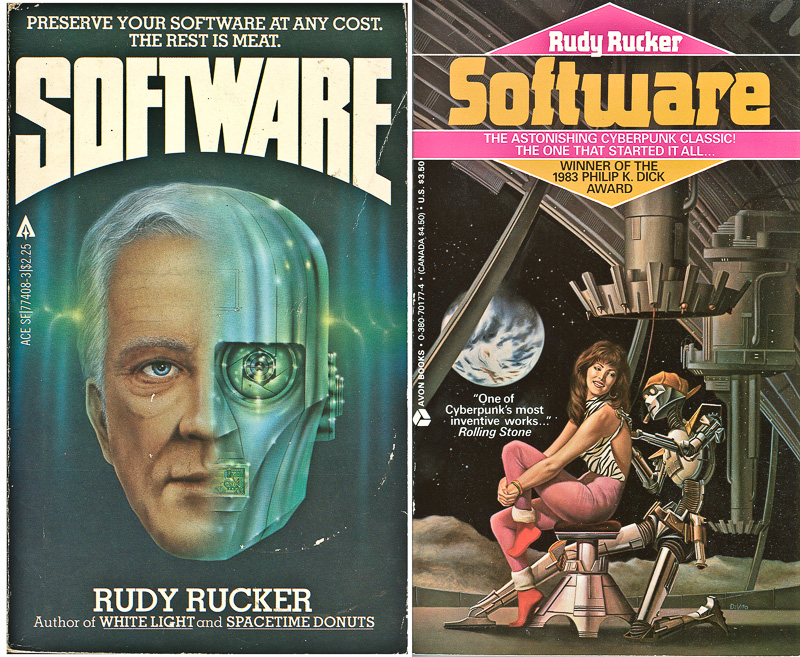
Sept 29, 2020.
I’m at that point of working on Juicy Ghosts that I once heard my mentor Robert Sheckley call the “black point” of writing a novel. You’re lost. At sea. You can’t see the shore you started from, nor the shore you wish to reach. I think I say this at some (black) point in my novel notes each time.
Today I went to the real ocean, walking on Panther Beach north of Santa Cruz with my old pal Jon Pearce. Off and on, I thought a about my Juicy Ghosts plans. The tech has to get a lot simpler.

Step back. When I started using the phrase “juicy ghost” two or three years ago, I was thinking about how to remedy an ordinary dumb AI program that lacks, if you will, soul, or the inner White Light, or a numinous sense of the I Am. Every living organism has these things. If we can pass that feeling to a dull robotic AI data ghost of a person, then we can make it be a juicy ghost.
My reasons for proposing this trope are simple. We humans like to feel that we’re better than AI programs, and that we still will be even if the programs can beat us at chess. We like to suppose (correctly or not) that AIs without that inner Self cannot in fact write as well as us or create art that’s as good as we make.
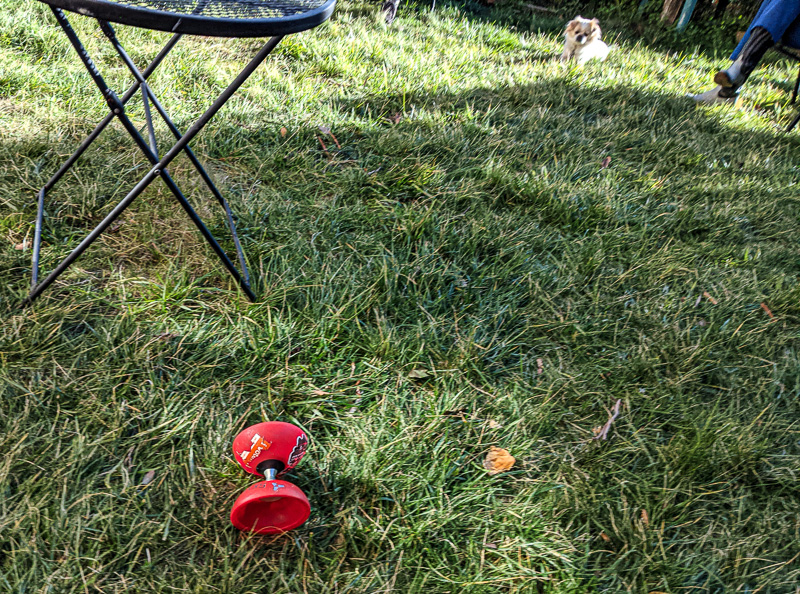
So what exact quality of mine is my bio-teep-hacker hero Gee Willikers going to feed to my lifebox to make it have Soul? Introspection time. I feel aglow from my two hours on the beach. Full of White Light. What is that feeling, though? How could it be conveyed to an AI in the cloud? Let’s type out a stream of consciousness rap:
Sitting here at a table on the sidewalk in front of Zoccoli’s in Santa Cruz after two hours on Panther Beach, I know exactly what the feeling is. The Om. The mirrorball inward reflection of my Self. The cool breeze on my bare legs, the murmur of voices, music practice sounds from an upper story of painted brick building behind me, the sun heavy on the asphalt street, the sour green light through the leaves and through the red cafe umbrella. The specks of not-very-good chocolate in my teeth. The slight wheeze in my chest. The Here, the Now. The radically contingent nature of life.

October 4, 2020
I’m rereading Phil Dick’s novel, A Scanner Darkly once again. It’s such a masterpiece, and I almost think a lot of the critics didn’t notice that, because it’s so language-with-a-flat-tire and low-brow, and academic critics are so achingly straight.
It’s not necessarily the best idea for me to reading the novel just now, as it bleeds over into what I’m writing. I keep wanting to use Phil’s expressions slushed, gunjy, and like that, and I am in fact doing that, but, oh well, it’s fine.

Scanner has a thing about the drug-damaged left brain, and thoughts leaking over from the right brain, and the person feels like the thoughts from another person or from an alien…so great. I’d like to see something like this could happen to one my characters in Juicy Ghosts.
“Are you getting any cross-chatter?” one of the deputies asked [PKD’s character Bob Arctor] suddenly.
“What?” he said uncertainly.
“Between hemispheres. If there’s damage to the left hemisphere, where the linguistic skills are normally located, then sometimes the right hemisphere will fill in to the best of its ability.”
“I don’t know,” he said. “Not that I’m aware of.
”“Thoughts not your own. As if another person or mind were thinking. But different from the way you would think. Even foreign words that you don’t know. That it’s learned from peripheral perception sometime during your lifetime.”

My favorite scene of all is Arctor’s freakout, on a freeway, after he nearly dies because someone (probably Barris) has fucked up his car under the hood so that his accelerator sticks at full speed.
He felt, in his head, loud voices singing: terrible music, as if the reality around him had gone sour. Everything now—the fast-moving cars, the two men, his own car with its hood up, the smell of smog, the bright, hot light of midday—it all had a rancid quality, as if, throughout, his world had putrefied, rather than anything else. … The smell of Barris still smiling overpowered Bob Arctor, and he heaved onto the dashboard of his own car. A thousand little voices tinkled up, shining at him, and the smell receded finally. A thousand little voices crying out their strangeness; he did not understand them, but at least he could see, and the smell was going away. He trembled, and reached for his handkerchief from his pocket.
Been there! But when I’m there I always remember that Phil Dick bit, and I can kind of laugh at the situation a little bit. Like, wow, this is really well done.
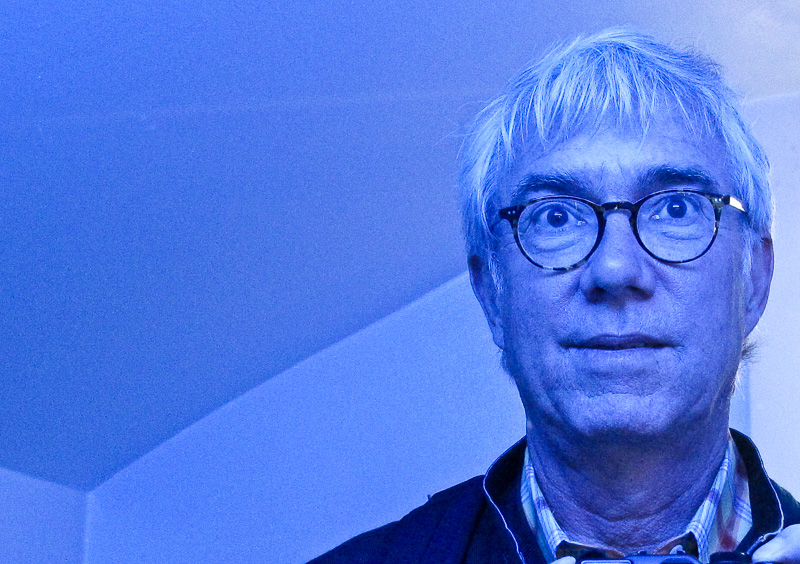
October 27, 2020
I’m writing some deeply funny/sad stuff on the new Chapter 6: “Carson Pflug.” In the end, its often the best when I give up on planning or thinking and just start writing. Fabulating, making things up, writing to amuse myself. I took off from a start line that the Muse handed me. “People say I’m an asshole, but I’m not.”
I’m writing a lot of dialog. I love dialog; the word count just piles up. Might want to fill in a few more visuals and interruptions for these passages. Phenomenal progress today;

November 4 – December 20, 2020.
I printed out the first six chapters I’ve written on Juicy Ghosts. And then, over the next five weeks, I cycled between marking up pages by hand and typing the changes in. I figure that once I get the first six chapters all tidy, with the plot all clear—then I’ll be in a good position to write the final chapter and be done with the book.
The revising was a lot of work. I had about twenty hand-corrections a page, and nearly 200 pages, so it meant about 4,000 corrections. I tried not to think about that number. I told myself to take my time and enjoy it. To knead the dough. But by the end, the process was a ruthless treadmill.
Here are some notes from that five-week period.
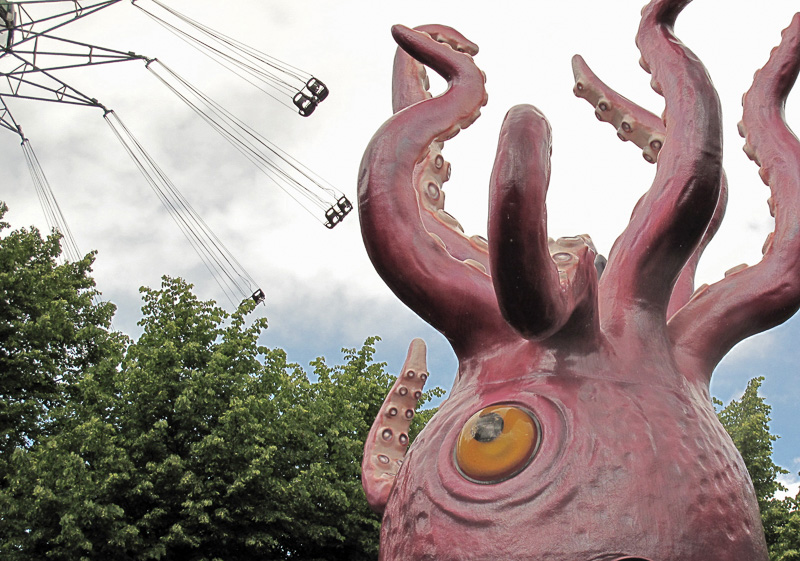
Normally I’d take a sheaf of papers down to the cafe and sit there marking them up. But now, thanks to Covid, I can’t do that. Sometimes I sit on park benches, if it’s not too cold. One day I took my slim folder-with-sheaf-of-papers-inside up into the woods on the hills. Nice to be outside while working—it was a beautiful sunny fall day—though a little sad and even pathetic not to be seeing the day, but just slaving away. Eventually my butt got tired from sitting on the ground and I had to stop anyway.
The revision process is astoundingly slow. I have to think about everything so much, and to fix so many things. I’m having to do a lot of rewriting, to make things work. Making the rubber science more uniform and internally consistent.

One of the big scenes in Juicy Ghosts involves the assassination of an evil U.S. President named Ross Treadle—who has connived himself into a third term in office.. With the first-term end of our own President Donald Trump’s reign now on the horizon, my novel has a different feel than it did when I started writing it nearly two years ago.
Now it’s more like alternate history instead of like frantic, fearful prophecy. Fine with me! I think it’ll go down better this way with the readers—that is, I think it has more mass appeal if Trump/Treadle really has been thrown out. If he was still in, the sting of my story would be too great.
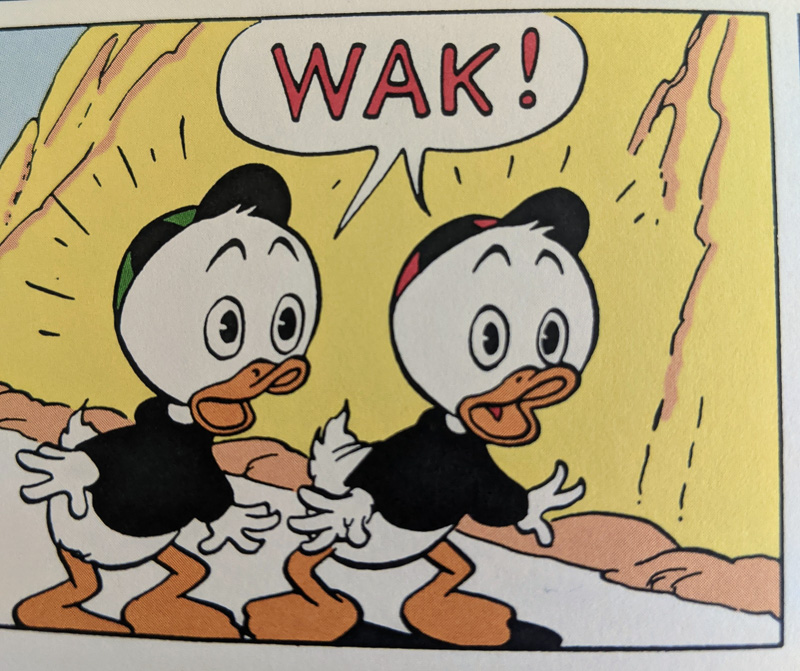
I have this wetware propaganda thing in Juicy Ghosts; it’s called Treadle Disease. It’s like a virus—which kind of overlaps with our Covid plague—except Treadle Disease has the effect of— making you want to vote for Treadle. The pseudo explanation of the disease. has to do with so-called gossip molecules, which are attached to our neurons, like waving pennants or tails or flagellae.
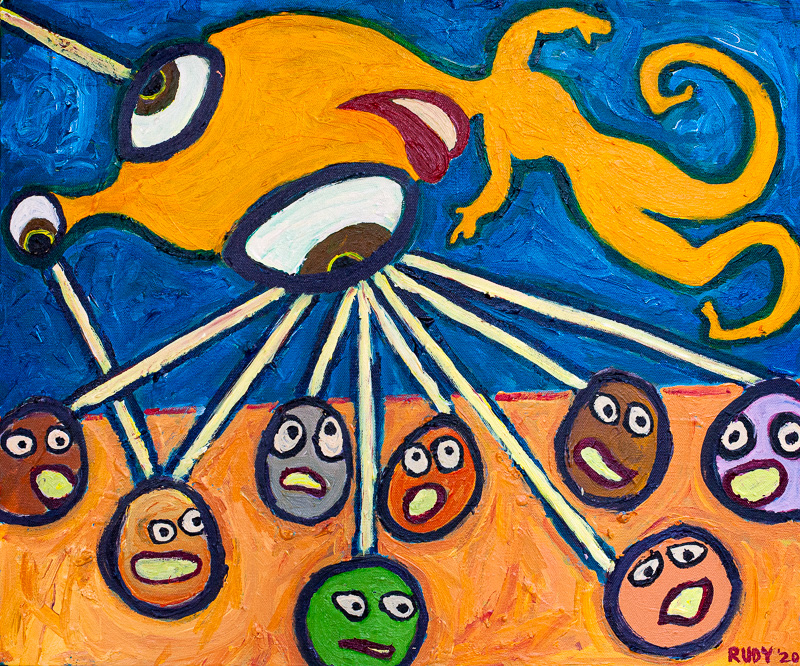
My character Molly eradicates Treadle Disease by teeping a quantum-level cleaner tornado to each of the sextillion Treadle Disease gossip molecules in people’s bodies across the world. That’s my painting of her above. While envisioning this mass-spamming-type teep scene, I was listening to the Clash play “I Fought The Law.” I think of the thought-beams as being like the part where the guitarist does this “stratocast” thing of playing the same ostinato riff six times in a row, over and over. The drums in this song are amazing too.

Something bad happens to Molly later on, when she’s helping to destroy Treadle’s lifebox in teepspace—which is my 21st Century name for cyberspace. The thing that attacks her is called Coggy, he’s a teepspace mind who looks like a big wad of gears, or like a stupid-ass giant Transformer robot. Molly has a different teepspace mind on her side, this one is female, and she’s named Metatron and she looks like a 1940s B-29 bomber, and maybe she has a painting on her fuselage showing a crocodile in a pinup pose. Surrealism forever!
Each time I finish revising a chapter and I get to a new chapter, I see the clean blank manuscript print-out pages, and I think, well, there won’t be many corrections in this section. But there are.

My superhacker hipster hero Gee Willikers was going to be guilty of mass killing because he collapsed the Washington Monument onto a crowd of demonstrators. To save the day, I now have him teep to all the people on the ground near the Monument, give them instructions on which way to run.
I was working on the revisions at a table on the street outside the Fleur de Cacao cafe in Los Gatos—we were allowed to have table service for like five days over the last ten months—and I was elated. It felt really cool to be writing SF so skintight close to the real world, that is, so close to the election and the Covid.
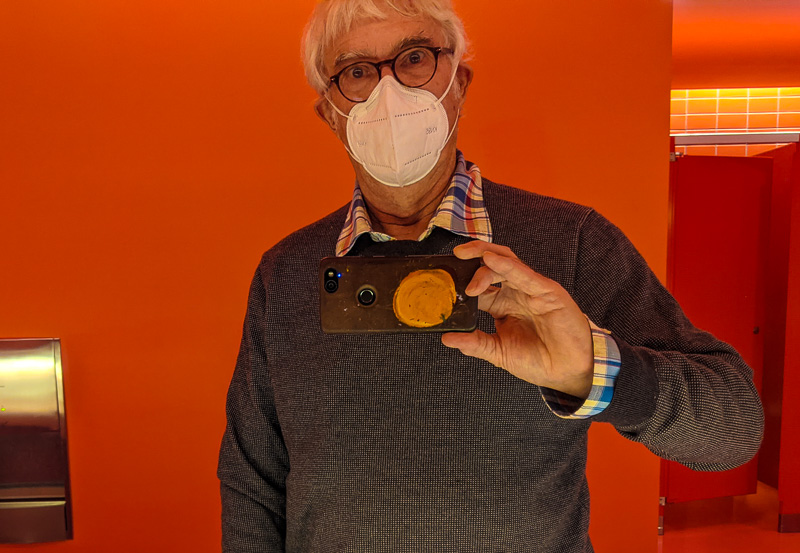
And then I thought of Thomas Pynchon’s remark (twice) in Gravity’s Rainbow about someone writing “words. . .only delta-t from the things they stand for.” Like, what you’re writing is a lambent glow overlay upon your somatic life at that very moment. Thinking about this inspired me buy the now-available Kindle edition of Gravity’s Rainbow, and I’m browsing it for an hour almost every day. Getting away from working and from doom scrolling. I like section 4: The Counterforce the best. So many great raps.
Typing in the changes of my manuscript is dull, but at the same time it’s fun. Relishing my craft. My body gets tired from the keyboarding.

At one point, I wiped out my day’s updated file by copying yesterday’s file on top of it. Six hours of work gone. I unaccountably ignored a warning sign on the screen. Fatigue I guess. I’ve really been pushing hard and it’s taking forever. Maybe I’m getting too senile to manage my documents.

I didn’t have the heart to tell Sylvia when I lost that file—but she kind of noticed my dejection. “You’re working really hard on this revision, aren’t you?”
Yes, I am. Too hard. I woke up at 2:30 am and couldn’t stop fretting about putting the corrections back in. So I got up and did it and then it was 4:30 am and I went back to bed.
The next day I set up two additional methods for automatic file backup.

Happy news from the real world. We got a nice, fresh, and very dark-green Xmas tree today. We’ve never gotten one so long before Christmas (still ten days off), normally we’d consider that a bit uncool, like overly eager, but this year we’re dying for any scrap of glitter or fun. I begged Sylvia to let me put on colored lights this year, though she prefers white. In theory we each get our pick on alternate years, but it’s always debatable. I’m looking at the light from the colored bulbs in the corner of the living room now. Almost as good as being drunk and stoned.

Well, Chapter 5: “Astral Body” took more work to revise than the previous ones. It had more rubber science problems than the earlier chapters. By the time I was done, I’d tried out three or four different ways of making Mary’s astral body.
I happened to notice, or to remember, the fact that I’ve been using some of the the Juicy Ghosts tropes for forty years—ever since I started up the Wares around 1980. This phenomenon of writing about something you think is a new idea, but actually you wrote about it before, it’s called cryptomnesia.
The situation in Juicy Ghosts is that for immortality: (1) You save your brain info to a lifebox in the cloud; (2) You get a physical clone body that has a perfectly usable (but blank) brain (3) You put an organic “psidot” onto the clone to act as a modem/controller connecting your lifebox and your clone. I’ve been talking about this idea for years. Here’s a talk on Digital Immortality I gave in 2019 in Miami, Florida, to a cryptocurrency group called IOHK. One of my more unusual gigs.
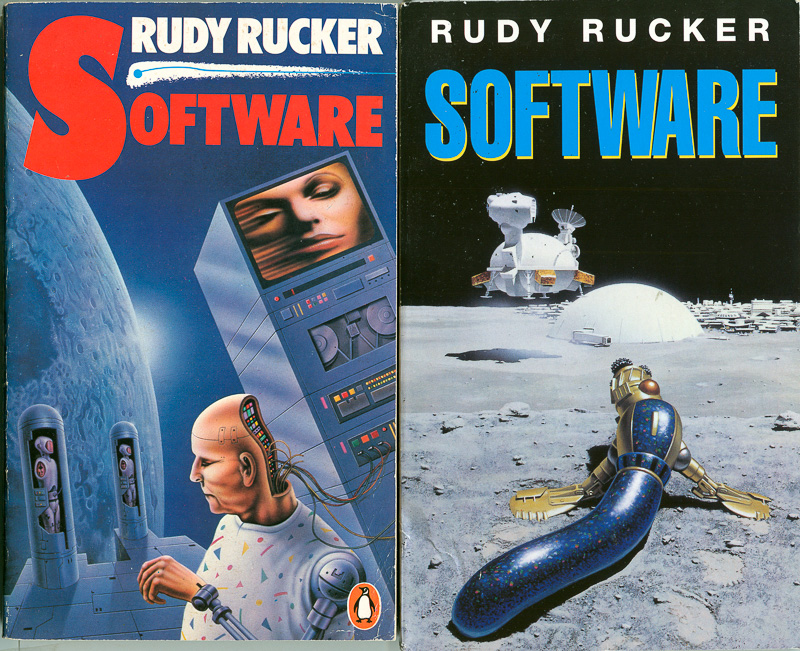
Looking back to the dawn of time, writing Software in 1979 they flash-loaded personality software directly onto a kind of android. So why not flash-download lifebox software directly onto a clone’s brain without a psidot or an astral body involved? But for immortality, you’d want to be saving and updating that software somewhere in advance that is, in a lifebox. (Although in Software, some robots extracted the software by eating the guy’s brain.)
In Wetware I had a happy cloak (basically a psidot brain modem with a lifebox stored inside it) that holds Wendy Mooney’s mind, and it settles onto a clone of her body and runs her clone, so she’s pretty much the same Wendy. I like that.
I’m having my character Mary package up her lifebox + psidot together inside an ionized plasma called her astral body. It has some quantum wireless so it doesn’t have to glued to her, it can just be somewhere nearby. With Gee’s help Mary creates her astral body in a single epic flash. Having her do it gives her extra agency. Her astral body looks like—a halo!
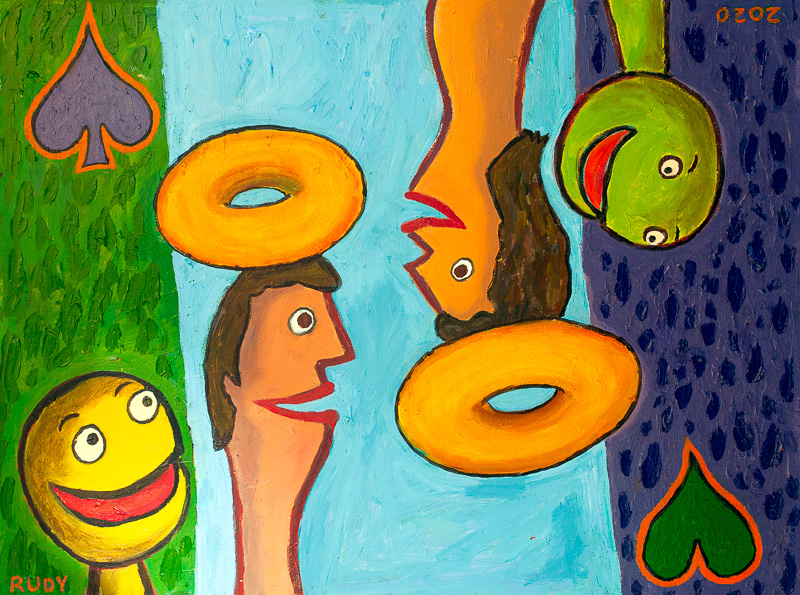
Probably my current focus on forms of immortality has to do with the fact that I’m 74 years old, and I worry about dying. Though, if you look at my novel Software, you can see I’ve been worrying about death for quite a long time. Like, since I was about 16, as I describe in my Beat scroll-novel, All the Visions. Here’s a podcast of me reading the bit where I realize I’m going to die.
Note that I don’t want to write about actual traditional ghosts in Juicy Ghosts. I did that in White Light. It worked there, but I want Juicy Ghosts to be more like a semi-plausible book about near-future career opportunities. Commercial telepathy. Commercial digital immortality.
I might also mix in another of my perennial obsessions, that is, hylozoism, that is, the concept that everything is alive. See my novel Hylozoic. I might allow a human astral body to use odd things as a body. Like an animal or plant or maybe even a rock, or a cataract in a stream. Not sure that would be an interesting way to go. “Then they were all embodied as swaying branches on the trees. The End.”

Finished off the revisions of Chaps 1-6 yesterday, with a nice rewrite of the closing scene of Chapter 6: Carson Pflug, written from Carson’s point of view. A taxi van driven by a Latino’s lifebox (he’s dead and this gig work pays the monthly storage fee for his lifebox) has just dumped Carson and Carson’s co-conspirator Jerr Boom at a spot in the woods which is targeted to be bombed by a so-called flappy, which is something like a living drone. The literal meaning of “pendejo” is “a pubic hair,” and it’s used to mean something like “idiot.”
“Adios, pendejos!” goes Bernardo, and he’s off down the hill, moving at a lightning clip, nimble as a deer in a thicket.
I see a redwood above us against the evening sky. Jerr makes as if to run away, but it’s too late. We’re out of time. I sigh, and relax at last.
The forest smells good. The world is beautiful. A dark shape approaches, her wings cutting the air. The flappy. She drops her first bomb.
Onward to Chapter Seven! Eventually….

Speaking of shop talk, SF/Horror author Cody Goodfellow did a long email interview with me, mostly me talking about writing, and it’s in the zine Forbidden Futures.









December 22nd, 2020 at 9:36 am
Just like all punk is 3 chords and the truth, repeated themes are a great tool to do the heavy living so you can sneak the exploration and narrative in.
December 29th, 2020 at 12:10 pm
Another story of yours spoke of ‘zik-zak’ and ‘kessence’. Zik-zak is folded space; it’s pure structure. Kessence is life-force. A computer without soul is just zik-zak; kessence is the juice in the ghost.